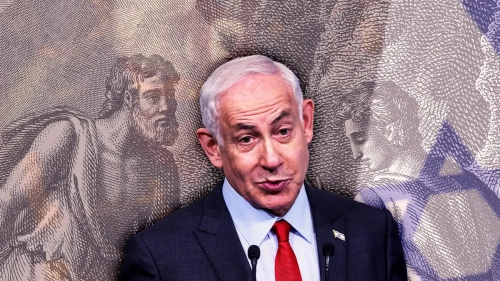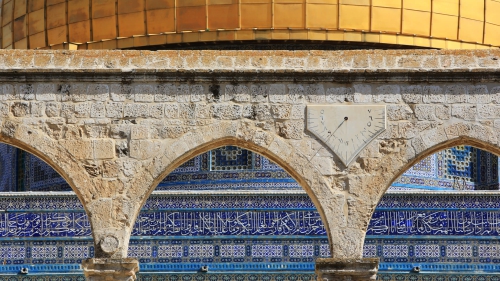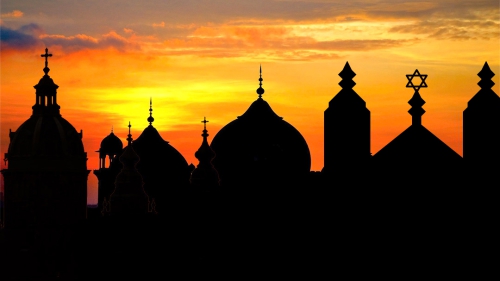Religion Is Very Easy

Faithful believers, who worship the One and only God, and sincerely follow the teachings of their religion, find it very hard to understand how other people who worship the same God and follow the same religious teachings, can engage in acts of corruption and deliberate terrorism. Perhaps we think that people of other religions can do such things; because we do not know in much detail what their religions actually teach them. But we do know our own religion, and we know that it does not permit the sexual exploitation or murder of women and children. Yet we frequently read of such activities, not only being done by members of our own religion, but condoned or covered up, by some leaders of our own religion. How can this be explained?
All religions condemn hypocrisy. Almost always this refers to those who claim to be believers, and yet do less than they should. But what about those who do more than they should? Examples of condemnation of religious fanaticism and extremism as hypocrisy within ones own religion are much less frequent. It is not easy to tell your own pious followers that more isn't always better, or that pious intentions do not justify evil deeds. The Talmud records a good example of this rare type of criticism of the more is better philosophy. Rabbi Isaac condemned the extremism of some super pious Jews who advocated extra self-imposed abstinence saying, "Aren't the things prohibited by the Torah enough for you, that you wish to prohibit yourself additional things?" And several Ahadith report that Muhammad told Muslims, "Religion is very easy, whoever overburdens himself in his religion will not be able to continue in that way. So do not be extremists, but try (only) to approach perfection, and receive the good tidings that you will be rewarded (just for that)."
If self-imposed extremism is condemned, how much more the extremism that hurts others. Indeed, all disgraceful activities by religious people reflect negatively on their religion and on God. In Judaism this is called Hillul Hashem- profaning God's name/reputation. In recent years religious riots in India, the slaughter of innocent Muslims at prayer by an Orthodox Jew in Hebron, Muslim suicide bombers throughout the Middle East and in Pakistan, and the cover up by Bishops of molestation of young boys by some Catholic Priests in the U.S. and Europe, brought terrible disgrace upon organized religion's reputation. One way to understand these terrible events is in the light of a saying by a Hassidic Rabbi (Michael) who taught, "When the Evil Urge tries to tempt people to sin, it tempts them to become super righteous."
God tells us that such activity must not be covered up or sanitized by religious believers. It must be vigorously and publicly condemned since it undermines the very ability of God's religion to influence people to live according to God's directives. We all know that religious people are human and sometimes religious people can do dastardly things. But when piety influences religious leaders to attempt to rationalize, sanitize, or cover up, rather than to publicly condemn these activities, people will increasingly reject organized religion and God. A religious piety that does not require morality and kindness is valueless and hypocritical, and thus as serious a sin as worshiping other Gods or idols, the first two of the Ten Commandments. The third commandment applies to pious religious hypocrites 'DO NOT MAKE VALUELESS THE NAME OF ADONAI YOUR GOD, FOR ADONAI WILL NOT SANITIZE ONE WHO MAKES HIS NAME VALUELESS.' Exodus 20:7 and Deuteronomy 5:11 (My translation) This commandment doesn't refer to the important issue of perjury, or to the trivial issue of profanity. Perjury is prohibited in the ninth commandment and profanity by itself isn't serious enough to be placed in the Ten Commandments. This commandment refers to the great harm done to religion, and to God's reputation, when religious people do despicable deeds in God's name and/or religious leaders try to cover up or sanitize the sins of religious people to preserve the institution's name. The burning of witches, the Inquisition, and Jihad suicide bombers, are examples of the misuse of God's name by some segments of organized religion. This commandment warns religious people and their leaders that, "Men never do evil so completely and cheerfully as when they do it from religious conviction." (Pascal)
Fanatics believe the ends justify the means, thus subordinating God's goal to their personal or political goal. Extremists believe that more is always better. To them the Talmud says, "If you (try to) grasp too much, you don't grasp anything." Our Rabbinic sages extended the prohibition of misusing God's name even to taking unnecessary oaths i.e. not required by a court, and making unnecessary blessings i.e. not required by Jewish law. Personal piety and sincerity do not justify excessive behavior even if self-limited. How much the more so if extremists judge others by their perfectionist standards? Religious people should not misuse their piety by going beyond normal community limits, and then try to justify it in God's name. This is a religious principle that Islam, Judaism and Christianity apply to both excessive personal, as well as political behavior. As the Bible says, "Do not be overly righteous." (Ecclesiastes 7:17): and as Muhammad told Muslims, "Religion is very easy, whoever overburdens himself in his religion will not be able to continue in that way. So do not be extremists, but try (only) to approach perfection and receive the good tidings that you will be rewarded (just for that)."
*****
Rabbi Allen S. Maller retired after serving for 39 years as Rabbi of Temple Akiba in Culver City, Ca. His web site is rabbimaller.com.
Related Suggestions
I have only one small bone to pick. When the learned Rabbi Maller speaks of institutions "sanitizing" the sins of their followers, he states: "The burning of witches, the Inquisition, and Jihad suicide bombers, are examples of the misuse of God's name by some segments of organized religion. " In my opinion, it would have made his argument that much stronger to include examples of Jewish extremism here, for example the cover-up of Jewish settlers' unlawful land expropriation and murder of Palestinians.
On the whole,though, Rabbi Maller makes a very good point that applies to all who take their religions zeal too far.
these root evils,it will be impossible to eradicate the poison of
religious extremism
{Allah refers us as Children of Adam and none but MUSLIMS in Quran, and also refers the only religion ISLAM by name and No other religion/Madhab was addressed in any holy books}.
Quran 5:3 "...This day have I perfected your religion for you, completed My favor upon you, and have chosen for you Islam as your religion."
Quran 2:132 And this (submission to Allah, Islam) was enjoined by Ibrahim (Abraham) upon his sons and by Ya'qub (Jacob) (saying), "O my sons! Allah has chosen for you the (true) religion, then die not except in the Faith of Islam(as muslims - Islamic Monotheism)."
Quran 5:111 And when I (Allah) revealed to Al-Hawariyyun (the disciples) [of 'sa (Jesus)] to believe in Me and My Messenger, they said: "We believe. And bear witness that we are Muslims."
Quran 2: 185 (Allah desireth for you ease; He desireth not hardship for you."
Hadith: "The best parts of your religion are the easiest ones."
Quran 5: (Allah would not place a burden on you.) (Al-Ma'idah)
Hadith: "Whenever the Prophet had to choose between two things he adopted the easier one, provided it was not a sin. If it was a sin, he would be the farthest one from it." `A'ishah's narration.

















